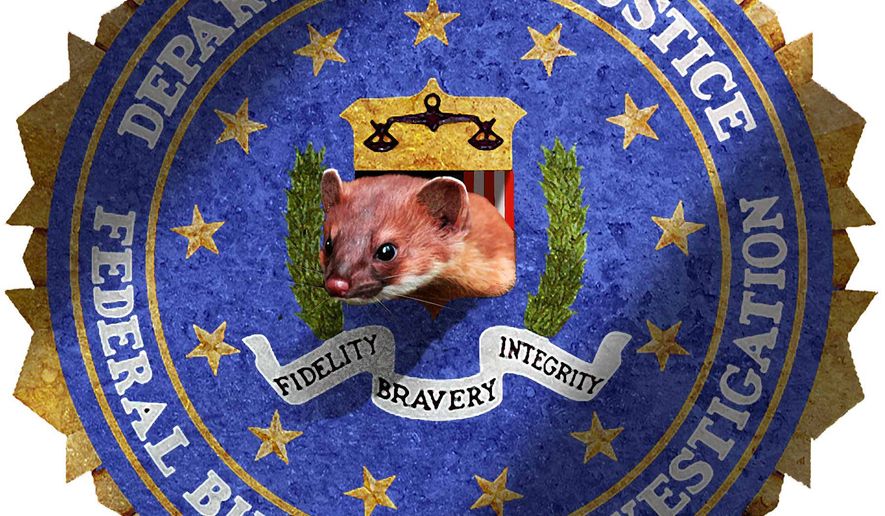OPINION:
Since its inception, the Federal Bureau of Investigation (FBI) has earned a reputation for independence and incorruptibility.
The Bureau has done stellar work over the years enforcing federal laws, nabbing bad guys, infiltrating the Ku Klux Klan, and has benefited from positive media coverage and popular television and film portrayals.
In the 1930s, newspapers thrilled readers with accounts of the G-Men (Government Men) taking down career criminals such as John Dillinger and George “Machine Gun” Kelly. It was Kelly who gave the agents the nickname “G-men.” The gangster was cornered in Memphis in 1933 by FBI agents, and allegedly shouted with his hands up, “Don’t shoot, G-Men.”
In 1959, “The Untouchables” TV show debuted on ABC, starring Robert Stack. It ran until 1963. From 1965 to 1974, Efrem Zimbalist Jr., fresh from a star-making run on the L.A. detective drama “77 Sunset Strip,” anchored the hit ABC series “The FBI.” The closing sequence has him driving a classy new Mustang convertible — as cool as it got back then.
In 1987, Kevin Costner starred in a film version of “The Untouchables” in which Sean Connery won an Oscar for best supporting actor.
All of these portrayals, and more recent ones in such shows as “24” and “Designated Survivor” depict the “G-men” (and G-women) as courageous, resourceful and above corruption.
That’s why current FBI Director James B. Comey’s insistence at a congressional hearing last Wednesday that, “We are not weasels” was so jarring. I’ve never heard anyone dare suggest the FBI harbored “weasels.”
Reminiscent of Richard Nixon proclaiming “I’m not a crook,” Mr. Comey’s remarkable statement should have gotten far more play. The Washington Post reported it in the very last paragraph in an inside article. But, then, consider the article’s subject: Republican House committee members were asking thorny questions about why the FBI wouldn’t reopen the case of Hillary Clinton’s compromised email server even though the FBI granted several of her aides immunity from criminal prosecution.
If no criminal activity is suspected, why did the aides need immunity in exchange for turning over their laptops? Why didn’t the FBI subpoena the laptops instead of giving Cheryl Mills and Heather Samuelson immunity, which then exempts their laptops’ contents from use as evidence in any prosecution? How convenient. Why, also, did server chief Bryan Pagliano get immunity and then skip his scheduled appearances to testify before the committee? Is anybody holding these people accountable?
Many Americans were taken aback when Mr. Comey in July signaled the Justice Department to drop any plan to prosecute Hillary Clinton and her staff members. This came right after Bill Clinton’s well-publicized “impromptu” meeting on the tarmac in an airplane in Phoenix with Attorney General Loretta E. Lynch, who announced days later that Hillary would face no charges. Apart from the glaring conflict of the nation’s top prosecutor meeting privately with the husband of a probe subject, the FBI is also investigating charges that the Clinton Foundation operated as a massive pay-to-play piggy bank with foreign money for the Clintons while Hillary was Secretary of State.
As for Mr. Comey, his July 6 statement that “no reasonable prosecutor would bring such a case,” came as he showed how Mrs. Clinton and her aides had been “extremely careless” with classified material. Evidence had been destroyed, including more than 30,000 e-mails and more than a dozen smart phones and other devices, and Mrs. Clinton has lied multiple times about it all. There’s nothing to see here, folks.
At the Sept. 28 hearing, committee members learned that Paul Combetta, a Platte River Networks employee who worked on Mrs. Clinton’s email server, had deleted numerous e-mails in 2015 after the Benghazi committee had requested their preservation.
Does that sound criminal to you? It does to me. But Mr. Comey brushed it off: “That’s why the guy wouldn’t talk to us without immunity.” Oh. Okay then. He went on to explain that Mr. Combetta told investigators that he had been ordered to delete the emails a year before, had not done so, and went back to do it on his own despite being required to preserve them. Mr. Pagliano was also asked in 2013 by Clinton aide Cheryl Mills about software for “wiping computer data,” and another Platte employee named the subsequent work order as the “Hillary coverup operation,” according to The Wall Street Journal.
We’re supposed to be OK with this?
“Comey bristled at any suggestion that Clinton faced a double standard or that FBI agents were influenced by politics,” The Post reported.
“You can call us wrong, but don’t call us weasels,” Mr. Comey said. “We are not weasels.”
This should have been front-page news. But that might have damaged Mrs. Clinton, The Post’s editors obviously decided.
Is it any wonder fewer Americans than at any time in history trust the media? Or the political ruling class?
• Robert Knight is a Washington Times contributor.




Please read our comment policy before commenting.